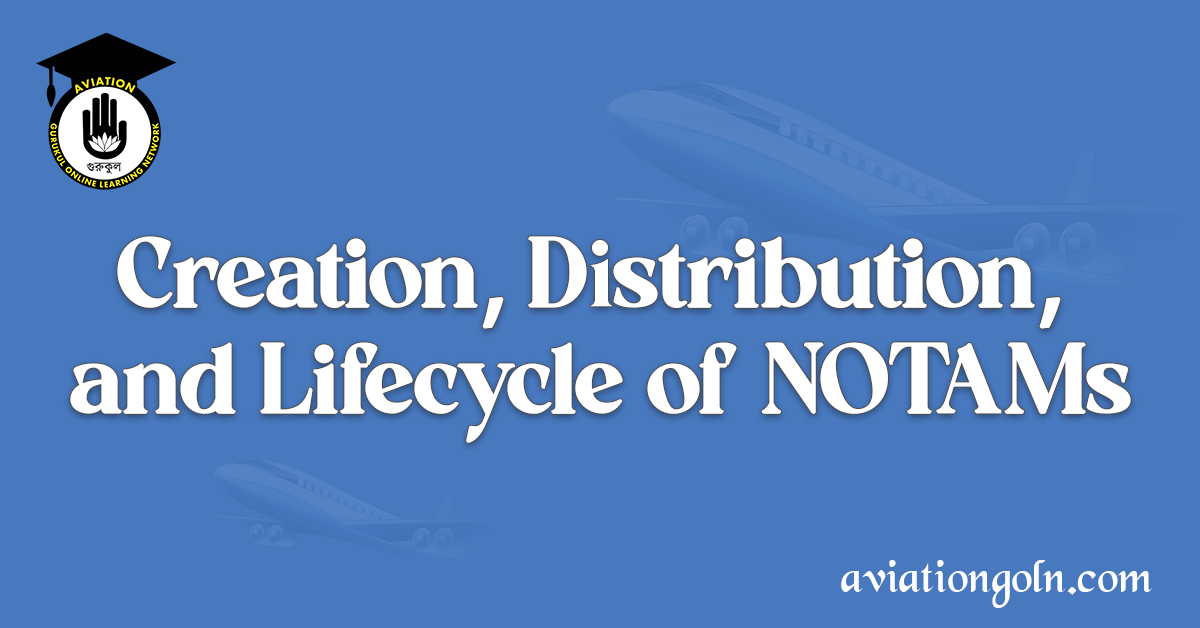Creation, Distribution, and Lifecycle of NOTAMs: The NOTAM system (Notice to Airmen) is an integral aspect of aviation. It provides timely and essential information to flight crews, ensuring that they are always updated on changes and potential hazards in the airspace system. Understanding the creation, distribution, and lifecycle of NOTAMs, as well as pre-flight information bulletins, is critical for maintaining safety in the skies.
Creation, Distribution, and Lifecycle of NOTAMs: NOTAM and Pre-Flight Information Bulletins
1. The Genesis of NOTAMs
1.1. What is a NOTAM?
NOTAM stands for “Notice to Airmen.” It’s a short message distributed by means of telecommunication containing information concerning the establishment, condition, or change in any aeronautical facility, service, procedure, or hazard, the timely knowledge of which is essential to personnel involved in flight operations.
1.2. Need for NOTAMs
The world of aviation is in constant flux. Airports undergo maintenance, navigation aids may malfunction, temporary obstructions can emerge near runways, and other unforeseen changes can affect flight safety. NOTAMs fill the communication gap by ensuring that such vital information reaches all relevant personnel.

2. Creation of NOTAMs
2.1. Authority and Responsibility
The responsibility for issuing NOTAMs typically lies with national aviation authorities. For example, in the United States, the Federal Aviation Administration (FAA) takes charge. Authorities receive information from various sources: airports, navigation service providers, or other related entities.
2.2. Types of NOTAMs
- FIR NOTAMs: Relate to facilities, services, or procedures in the Flight Information Region (FIR).
- Airport NOTAMs: Specific to a particular airport, detailing changes or issues at that location.
- En-route NOTAMs: Relevant for aircraft in flight, providing details about changes or hazards on a specific route.
2.3. Compilation and Verification
Once an authority receives a report warranting a NOTAM, they compile the necessary details into the standard format. This information is then verified for accuracy and relevance before it’s released.

3. Distribution of NOTAMs
3.1. Channels of Distribution
Several mechanisms ensure broad distribution of NOTAMs:
- Aeronautical Fixed Telecommunication Network (AFTN): An international system transmitting messages between airports and control centers.
- Digital NOTAM System: An evolution in NOTAM distribution, providing digital dissemination.
- Pilot Briefings: Prior to departure, pilots receive briefings that include relevant NOTAMs for their route.

3.2. Pre-flight Information Bulletins (PIBs)
PIBs compile NOTAMs and meteorological information for specific routes. They’re tailored to a pilot’s flight plan, ensuring they only receive relevant updates.

4. Lifecycle of a NOTAM
4.1. Duration and Validity
NOTAMs come with a defined duration. While some may be valid for just a few hours, others can remain active for weeks. However, no NOTAM remains in place indefinitely. Once its purpose is served, it’s superseded by an amendment to an Aeronautical Information Publication (AIP) or removed after its expiration.
4.2. Cancellation and Replacement
If conditions change or the situation resolves before the NOTAM’s expiry, it can be cancelled. If the information needs updating, the NOTAM is replaced by a new one, providing the latest data.

5. Challenges and Innovations
5.1. Volume of NOTAMs
One challenge facing pilots is the sheer volume of NOTAMs, especially for long-haul flights. Sifting through them can be time-consuming.
5.2. Digital Innovations
To address the above challenge, digital tools now prioritize NOTAMs, highlighting the most relevant ones based on a pilot’s flight plan.
5.3. Global Standardization
Given the international nature of aviation, efforts are ongoing to standardize NOTAM formats and processes globally. This ensures that, regardless of origin or destination, flight crews can quickly interpret the information.

NOTAMs play a pivotal role in maintaining flight safety, bridging the gap between rapid changes in the aviation environment and the people who need to know about them. From their careful creation, wide distribution, and systematic lifecycle management, these critical pieces of information embody the aviation industry’s commitment to safety and efficient communication. As technology advances, the NOTAM system will undoubtedly continue to evolve, making the skies even safer for all.
